|
|
|
Sort Order |
|
|
|
Items / Page
|
|
|
|
|
|
|
| Srl | Item |
| 1 |
ID:
161653
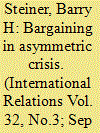

|
|
|
|
|
| Summary/Abstract |
Diplomacy, defined as formal communication and bargaining between states, is subject to limits that diplomatic theory must demarcate and understand. This article compares state incentives and disincentives (including rejection of negotiation as well as refusal to concede) affecting the decision whether to negotiate in six cases of interstate crisis between militarily unequal antagonists. While it has been argued that asymmetric powers are more likely to reach negotiating agreement than their symmetric counterparts, with weaker states doing surprisingly well, that finding is questioned here in the crisis context. For example, the militarily inferior antagonist, attracted to diplomacy as an alternative to war, might well anticipate inferior results from direct negotiations. The weaker antagonist’s unwillingness in these cases to negotiate with a strong opponent suppressed diplomacy, but great power support for the weaker side, and the stronger power’s lack of war readiness, added to the stronger antagonist’s willingness to negotiate.
|
|
|
|
|
|
|
|
|
|
|
|
|
|
|
|
| 2 |
ID:
057760
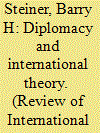

|
|
|
| 3 |
ID:
087301
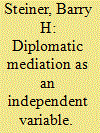

|
|
|
|
|
| Publication |
2009.
|
| Summary/Abstract |
Successful third-party diplomatic mediation illustrates diplomacy as a causative, independent element in world politics. This article asks how mediators forge agreement between force-prone, deadlocked parties in intractable diplomatic conflict, and why some such conflicts are more difficult to mediate than others. It compares three interstate and three intrastate mediation cases, each probed as a deviant episode, and tests the conventional view that intrastate conflict presents the more difficult mediation challenge. Confirming that intrastate conflict is more difficult to mediate than its interstate counterpart, the study narrows and refines the sources of the added difficulty.
|
|
|
|
|
|
|
|
|
|
|
|
|
|
|
|
| 4 |
ID:
158140
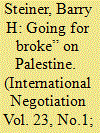

|
|
|
|
|
| Summary/Abstract |
This article, a corrective to long-time frustration experienced by the United States in mediating Israel-Palestine differences, argues for American recognition of a Palestinian state to reach a two-state solution. Recognition, though not even-handed, constitutes legitimate mediation, as confronting one or another primary antagonist can be a useful mediation strategy. Though Israel is likely to object to US recognition of Palestine, analysis suggests the objection is not likely to lead to a break in Israel-American relations, which would jeopardize the valued Israel-American alliance. Recognition as a fallback option is recommended for the Trump administration’s way forward in mediating the conflict.
|
|
|
|
|
|
|
|
|
|
|
|
|
|
|
|
| 5 |
ID:
108810
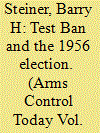

|
|
|
|
|
| Publication |
2011.
|
| Summary/Abstract |
Adlai Stevenson, the Democratic presidential candidate in 1952 and 1956, has been called "the first national political leader to take a clear-cut position for the limitation of [nuclear weapons] testing."[1] In his 1956 campaign against President Dwight Eisenhower, the former Illinois governor capitalized on widespread fear of radiation from nuclear weapons tests to propose a testing moratorium, but he had not intended to make the tests a major campaign issue at first.
|
|
|
|
|
|
|
|
|
|
|
|
|
|
|
|
| 6 |
ID:
100936
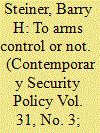

|
|
|
|
|
| Publication |
2010.
|
| Summary/Abstract |
Arms races, in which competitors attempt to improve their military power in relation to each other, vary in the competitors' propensity to diplomatically seek arms restraint. To assist empirical understanding of the incidence of arms restraint, this essay compares the Soviet-American nuclear arms competition in which such restraint was ample and long-standing, with a 19th-century Anglo-French naval competition in which arms diplomacy was completely absent. In a preliminary probe, three independent variables are applied to explain this variance, each logically linked to arms restraint and to self-help: (1) use or non-use of force equivalence to compare military forces; (2) use or non-use of national intelligence to reduce strategic uncertainty; and (3) linkage or non-linkage of the competition with the rival's overall diplomatic relationship. The conclusion is that only the last of these variables accounts significantly for the differences in diplomatic effort; the naval rivalry was largely disconnected from the Anglo-French geopolitical relationship, while the superpower competition was strongly linked to the larger superpower diplomatic framework. This conclusion is applied to the contemporary North Korean-American and Pakistan-India arms competitions.
|
|
|
|
|
|
|
|
|
|
|
|
|
|
|
|
| 7 |
ID:
114824
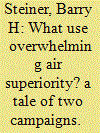

|
|
|
|
|
| Publication |
2012.
|
| Summary/Abstract |
Longer wars between mismatched opponents often end with the militarily weaker side showing unexpected strengths. This article tests this tendency in two short wars in which overwhelming force superiority was applied in massive air attacks. Operation Enduring Freedom (the 2001 American campaign in Afghanistan) and Operation Cast Lead (the 2008-2009 Israeli campaign in Gaza) both began with air offensives that shifted to air-supported ground combat, but Enduring Freedom (a Type A operation) gave priority to aerial attack, while in Cast Lead (Type B) air operations primarily paved the way for ground combat. Neither campaign was fully decisive, suggesting that the residual capabilities of weaker combatants apply to short as well as protracted hostilities. The Type A attack was decisive against the Taliban, but not against al Qaeda. The more intensive Type B case, Cast Lead, did not lead to greater decisiveness than its counterpart, with Israel emphasizing force demonstration to enhance deterrence of attack, yet not seeking to destroy Hamas's residual military capability. The problem of translating large military superiority into decisive war results is also evident recently in more common, stretched out, and restrained airpower use supporting higher-priority ground combat, as in NATO's 2011 intervention in Libya and the aerial drone campaign in Pakistan supporting NATO war making in Afghanistan.
|
|
|
|
|
|
|
|
|
|
|
|
|
|
|
|
|
|
|
|
|